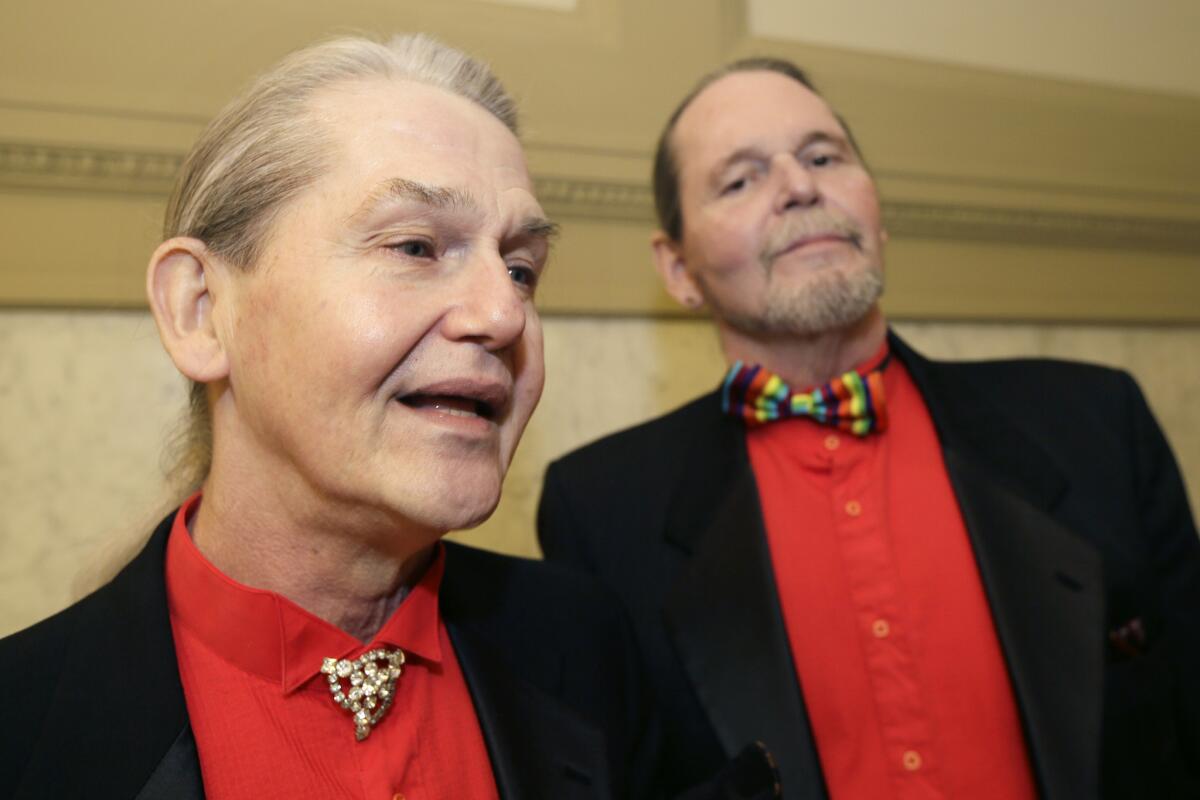Arkansas ban on gay marriage struck down by county judge, with no stay

- Share via
A county judge in Arkansas struck down his state’s constitutional bans on gay marriage, saying in a ruling Friday night that they did not advance “any conceivable legitimate state interest.”
In finding the ban unconstitutional, Pulaski County Circuit Judge Christopher Piazza cited the series of federal court rulings, including those in Utah and Virginia, that have been issued since the U.S. Supreme Court struck down portions of the federal Defense of Marriage Act. That landmark ruling has led to a spate of lawsuits in about a dozen states seeking to topple bans on same-sex marriage.
“Same-sex couples are a morally disliked minority and the constitutional amendment to ban same-sex marriages is driven by animus rather than a rational basis,” Piazza wrote. “This violates the United States Constitution.”
The judge did not issue a stay, meaning same-sex marriages could begin as soon as county clerks next open their doors. However, Arkansas Atty. Gen. Dustin McDaniel plans to ask for a stay and immediately appeal to the Arkansas Supreme Court, which has initial jurisdiction on all county circuit appeals.
“We respect the court’s decision, but, in keeping with the attorney general’s obligation to defend the state constitution, we will appeal,” spokesman Aaron Sadler said. “We will request that Judge Piazza issue a stay of his ruling so as not to create confusion or uncertainty about the law while the Supreme Court considers the matter.”
Piazza’s ruling stems from a lawsuit filed by 12 same-sex couples who sought to wed in Arkansas and eight same-sex couples who had legally married in other states. They had been barred from either receiving marriage licenses or having their marriages recognized because of a 1997 law approved by lawmakers and a 2004 voter-approved amendment to the state constitution.
Piazza said the measures illegally “narrowed the definition of equality.”
“The exclusion of a minority for no rational reason is a dangerous precedent,” he wrote.
McDaniel defended the measures, though he said last week that he does not personally support them.
The state had argued that the Arkansas had a right to ban same-sex marriage in the name of protecting children, preserving tradition and favoring the ability to procreate.
But Piazza found none of those to be legitimate because no law requires opposite-sex couples to have children or precludes same-sex couples from taking care of them.
Piazza said he didn’t want to be among those judges who didn’t protect unpopular minorities, hearkening back to the days of racial segregation and bans on interracial marriage.
“Our freedoms are often acquired slowly, but our country has evolved as a beacon of liberty in what is sometimes a dark world,” he wrote. “It is time to let that beacon of freedom shine brighter on all our brothers and sisters. We will be stronger for it.”
State Rep. Greg Leding, a Democrat from Fayetteville, told The Times that he was thrilled with Friday’s ruling. But he warned that the court process was far from over.
“If you look at how these bans have fared in other states, I expect that it will be ultimately the same fate here and struck down, but it’s a long road ahead,” Leding said.
Jerry Cox, president of the Arkansas Family Council, said he was disappointed that the judge overturned the will of voters. He said it opened the door to polygamy and other, unspecified forms of alternative marriage.
“This ruling undermines marriage because once people start redefining marriage, there seems to be no place to stop,” he said in a statement. Cox expressed hope that the state’s Supreme Court would reach a “more sensible” conclusion.
The Human Rights Campaign, which recently announced an $8.5-million effort to advocate for gays in the South, said Friday that 70 marriage-equality court cases are active nationwide. Same-sex marriage is allowed in 17 states and the District of Columbia, the organization said.
More to Read
Sign up for Essential California
The most important California stories and recommendations in your inbox every morning.
You may occasionally receive promotional content from the Los Angeles Times.














